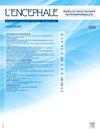Impact de la légalisation du cannabis à usage récréatif sur le risque de psychose : une revue systématique de la littérature
IF 1.2
4区 医学
Q4 NEUROSCIENCES
Encephale-Revue De Psychiatrie Clinique Biologique et Therapeutique
Pub Date : 2024-09-06
DOI:10.1016/j.encep.2024.05.003
引用次数: 0
Abstract
Introduction
Cannabis is the most consumed illicit substance in Europe. Although its sale and use remain generally prohibited, European public policies have evolved in recent years by legalizing cannabis for medical use and considering its legalization for recreational use. However, in the literature there are arguments in favor of a particular relationship between cannabis consumption and the development of psychotic symptoms. Thus, since cannabis consumption tends to increase with legalization, the aim of this review was to investigate the impact of the legalization of cannabis for recreational use on the risk of psychosis in regions of the world already concerned.
Method
A systematic review of the literature was carried out in April 2024 in the PubMed-Medline database according to PRISMA criteria. The sequence of keywords used was as follows: (“Cannabis” [Mesh] or cannabis) AND ((“Psychotic Disorders” [Mesh] or Psychotic Disorders) or (“Schizophrenia Spectrum and Other Psychotic Disorders” [Mesh]) or (“Schizophrenia” [Mesh] or Schizophrenia)) AND legal use. The inclusion criteria applied for the selection of articles in this systematic review were: (1) any article investigating the potential impact of the legalization of cannabis for recreational use on the risk of psychosis (any type of psychosis diagnosed according to ICD-9, ICD-10, DSM-4 or DSM-5) by the intermediary of epidemiological (incidence or prevalence) and/or clinical (ambulatory consultations, emergency visits or hospitalizations) criteria, (2) any type of study (cross-sectional, longitudinal, prospective, retrospective, interventional and experimental) with a methodology including a temporal and/or geographic comparison of the risk of psychosis associated with the legalization of cannabis for recreational use with the exception of literature reviews and clinical cases descriptions, (3) absence of limitation for the age of the populations studied and for the date of publication, and (4) articles written in English or French. After evaluation by the two authors of the 160 articles identified, seven studies investigating the impact of the legalization of cannabis for recreational use on the risk of psychosis were included in this systematic literature review.
Results
Four of the studies showed no increase in the use of health services for psychosis following the legalization of cannabis for recreational use whereas three other studies highlighted a negative impact of the legalization of cannabis for recreational use on the risk of psychosis. All of these studies were carried out in North America and were characterized by a low level of scientific evidence.
Conclusion
Given the complexity of assessing the impact of the legalization of cannabis for recreational use on the risk of psychosis, additional investigations through studies of better scientific quality are essential. However, based on the data already available, there is some evidence that there is a potential negative impact on mental health due to the legalization of cannabis for recreational use. In this context, in the event of legalization of cannabis for recreational use it seems essential to recommend lower risk use of cannabis (limit the frequency of use, delay the age of first consumption, control the THC content of products and promote prevention/education). Finally, in order to enable dynamic evolution of public health strategies the establishment of continued monitoring is essential as cannabis legalization evolves.
[娱乐性大麻合法化对精神病风险的影响:文献系统回顾]。
简介大麻是欧洲消费最多的非法物质。虽然大麻的销售和使用仍然普遍受到禁止,但近年来欧洲的公共政策已经发生了变化,大麻的医疗用途合法化,并考虑将其合法化用于娱乐用途。然而,文献中也有论点支持大麻消费与精神病症状发展之间的特殊关系。因此,由于大麻消费往往会随着大麻合法化而增加,本综述旨在调查大麻娱乐合法化对世界相关地区精神病风险的影响:根据 PRISMA 标准,于 2024 年 4 月在 PubMed-Medline 数据库中对文献进行了系统性综述。使用的关键词顺序如下:(大麻"[Mesh]或 "cannabis")和("精神障碍"[Mesh]或 "精神障碍")或("精神分裂症谱系和其他精神障碍"[Mesh])或("精神分裂症"[Mesh]或 "精神分裂症")和合法使用。本系统综述在选择文章时采用的纳入标准是(1) 以流行病学(发病率或流行率)和/或临床(门诊、急诊或住院)标准为中介,调查娱乐性使用大麻合法化对精神病(根据 ICD-9、ICD-10、DSM-4 或 DSM-5 诊断的任何类型的精神病)风险的潜在影响的任何文章,(2) 任何类型的研究(横断面研究、纵向研究、前瞻性研究、回顾性研究、干预性研究和实验性研究)、(2) 任何类型的研究(横断面研究、纵向研究、前瞻性研究、回顾性研究、干预性研究和实验性研究),研究方法包括对与娱乐性使用大麻合法化相关的精神病风险进行时间和/或地域比较,但文献综述和临床病例描述除外,(3) 对研究人群的年龄和发表日期没有限制,(4) 以英文或法文撰写的文章。经过两位作者对所确定的 160 篇文章进行评估后,本系统性文献综述纳入了七项研究,这些研究调查了娱乐性使用大麻合法化对精神病风险的影响:结果:其中四项研究表明,娱乐性吸食大麻合法化后,因精神病而使用医疗服务的情况没有增加,而另外三项研究则强调了娱乐性吸食大麻合法化对精神病风险的负面影响。所有这些研究都是在北美进行的,其特点是科学证据水平较低:鉴于评估娱乐用大麻合法化对精神病风险影响的复杂性,必须通过科学质量更高的研究开展更多调查。不过,根据现有数据,有一些证据表明,娱乐用大麻合法化可能会对精神健康产生负面影响。在这种情况下,如果娱乐性使用大麻合法化,似乎有必要建议降低使用大麻的风险(限制使用频率、推迟首次消费年龄、控制产品中四氢大麻酚的含量以及促进预防/教育)。最后,为了使公共卫生战略能够动态发展,随着大麻合法化的发展,建立持续监测至关重要。
本文章由计算机程序翻译,如有差异,请以英文原文为准。
求助全文
约1分钟内获得全文
求助全文
来源期刊
CiteScore
4.60
自引率
7.40%
发文量
162
审稿时长
6-12 weeks
期刊介绍:
Une revue française de renommée internationale.
- Un comite de rédaction représentant tous les aspects de la prise en charge psychiatrique du patient.
- Une sélection rigoureuse d''articles faisant l''objet de plusieurs expertises.
- Des travaux d''auteurs et de chercheurs de renommée internationale.
- Des indexations dans les grandes bases de données (Current Contents, Excerpta Medica, etc.).
- Un facteur d''impact qui témoigne de la grande notoriété de la revue.
La tribune des publications originales de haut niveau.
- Une très grande diversité des sujets traités, rigoureusement sélectionnés à travers des sommaires dynamiques :
- des éditoriaux de médecins référents,
- une revue de presse sur les actualités internationales,
- des articles originaux pour approfondir vos connaissances,
- des mises au point et des cas cliniques pour engager votre réflexion sur les indications et choix possibles au travers de mises en situation clinique,
- des dossiers thématiques pour faire le tour d''une question.
- L''actualité de l''AFPB : L''Encéphale publie régulièrement des comptes rendus de l''Association française de psychiatrie clinique.

 求助内容:
求助内容: 应助结果提醒方式:
应助结果提醒方式:


